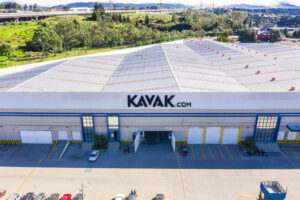
Por Jim Glade
July 29, 2025
The World Economic Forum unveiled its annual list of Technology Pioneers, highlighting 100 startups from 28 countries that are driving technological innovation. Among these prestigious group is Allie, a Mexican startup that develops artificial intelligence systems to optimize manufacturing processes.
Founded by Nicolas Degiorgis and Alex Sandoval, Allie developed FactoryGPT, a platform that acts as a digital assistant for industrial management. This technology provides real-time analysis of machinery operations and production processes, empowering plant managers to make faster, more informed decisions. Allie is already collaborating with major multinational companies in the food and beverage sector, including Heineken, Jumex and PepsiCo.
Addressing the technical complexities of implementing AI in critical industrial environments, Sandoval emphasizes that Allie does not believe in “approximations”. Their work involves “mission-critical” flows where every unproductive minute and every error can result in millions of dollars in losses. He detailed that their accuracy is built upon three fundamental pillars:
“Models trained in the field, not on generic datasets: each deployment is calibrated with the real variability and noise of each production line.”
The tangible results of this technology are already evident in the data collected by the company. The founder states that its customers have seen a “consistent reduction of unscheduled downtime, around 15-20%”, a “clear OEE improvement of 10-15 points” and a “decrease in material and energy waste, typically 5-10%”.
These figures are particularly significant given current pressures of supply chain pressures and rising energy costs.
Sandoval recalled facing “two fundamental challenges” to achieve this recognition. The first was “the chaos inherent in industrial data: incomplete, without labels, sometimes contradictory”. The second was earning “trust: a good algorithm isn’t enough if it does not deliver value at the plant level”. To overcome these hurdles, he explained that they involved “the teams from the beginning” and started with “low-risk use cases to test the value of the models”.
The WEF recognition comes at a pivotal moment for global manufacturing. Factors such as skilled labor shortages, logistics costs and increasing sustainability requirements are driving the adoption of 4.0 technologies.
Solutions like Allie’ s can be specially valuable for manufacturing plants in emerging markets, where digital transformation is advancing at varying rates.
For Sandoval, this milestone represents more than just an award. As he pointed out, “the recognition is not a goal, but a consequence of solving those underlying problems, which are common to all manufacturing.” Allie’s next challange will be to scale its technology while upholding the high standards of precision and safety that have earned it this prestigious international acknowledgement.
Allie’s success demonstrates how Latin America is beginning to produce high-impact technological innovation, capable not only of competing globally but also of solving concrete industry problems. Other Latin American companies including Brazil’s Brain4care, Colombia’s Plurall and Uruguay’s Prometeo were also recognized by the WEF.

Por Yanin Alfaro
February 17, 2026

Por Israel Pantaleón
February 17, 2026

Por Stiven Cartagena
February 13, 2026